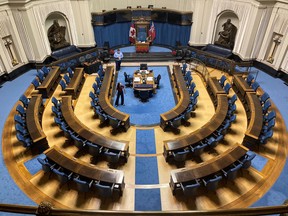Politics
Manitoba Premier Introduces Bill 50: Aiming for Accountability in Law

Manitoba Premier Wab Kinew has proposed new legislation, known as Bill 50, which mandates that any law invoking Section 33 of the Charter of Rights and Freedoms—commonly referred to as the notwithstanding clause—be automatically submitted to the Manitoba Court of Appeal for an opinion. Under this bill, the court will have a period of 90 days to determine whether the proposed law infringes upon Charter rights. Kinew asserts that this approach will enhance transparency and accountability, ensuring that Manitobans are fully informed about any rights that may be overridden before they cast their votes.
Justice Minister Matt Wiebe supports the bill, emphasizing that it acknowledges the existence of Section 33 as a constitutional reality while reinforcing the notion that ultimate authority should remain with the people. While the intentions behind the bill may seem reasonable at first glance, critics argue that it is unnecessary and could have negative repercussions for the province.
Historically, Manitoba has never utilized the notwithstanding clause, a tool designed to allow governments to temporarily override specific Charter rights for a maximum of five years. This clause was established as a safeguard during the patriation of Canada’s Constitution in 1982, ensuring that elected officials retain some authority over judicial interpretation. Critics contend that the introduction of Bill 50 undermines this principle by shifting the power of decision-making away from the legislature and inviting courts to assess legislation before it has been enacted.
Supporters of Bill 50 claim that it does not prevent the use of Section 33 but instead adds a layer of transparency. However, opponents argue that the bill addresses a non-existent problem. Any government that invokes the notwithstanding clause must already provide justification for its decision in a public forum. The perceived lack of transparency is more a matter of bureaucracy than a genuine need for clarity.
Concerns Over Judicial Authority
The implications of Bill 50 extend beyond mere procedural changes. Critics warn that requiring judicial input on legislation before it is enacted blurs the lines between the legislative and judicial branches of government. This shift could transform democratic institutions, allowing unelected judges to effectively pre-screen policies developed by elected officials. Such a scenario raises concerns about judicial overreach and the potential for the judiciary to influence policy-making.
Manitoba’s recent involvement in the Supreme Court challenge to Quebec’s Bill 21, which prohibits certain public employees from wearing religious symbols, highlights the ongoing national discourse surrounding the use of the notwithstanding clause. While the province’s participation in this case may resonate politically, it detracts from pressing local issues that require immediate attention, such as healthcare access, crime rates, and economic stability.
Residents in Manitoba face significant challenges, including lengthy wait times for medical treatment and rising crime rates in urban areas like Winnipeg. Families are feeling the financial strain due to increased costs of living, and businesses are struggling under heavy regulations. These pressing matters, rather than constitutional debates, are what Manitobans expect their government to address.
Call for Focus on Practical Issues
Kinew’s emphasis on Bill 50 has prompted calls for a shift in focus toward tangible results. Critics suggest that the Premier could prioritize initiatives that would create jobs and stimulate the economy, such as fast-tracking mineral and resource projects. Additionally, providing law enforcement with the necessary tools to combat repeat offenders and streamlining regulations to attract investment could yield significant benefits for the province.
The notwithstanding clause serves as a mechanism for governments to navigate exceptional circumstances where judicial interpretations of rights clash with public priorities. While it is essential to use this clause judiciously, its existence is crucial for maintaining a balance of power. Built-in safeguards, including the five-year limit and public accountability, ensure that any decision to invoke the clause is subject to scrutiny.
It is vital for elected officials to recognize that judges, like politicians, are not infallible. The notwithstanding clause empowers citizens by allowing their governments to make tough choices, which can ultimately be evaluated by voters. Attempts to redefine this balance, as seen in the push for Bill 50, may inadvertently centralize power in the hands of unelected officials, undermining the very democratic principles that politicians claim to defend.
In conclusion, Manitoba does not require more political theatre; it needs effective governance that addresses the immediate concerns of its citizens. The focus should be on delivering solutions that improve healthcare, enhance public safety, and alleviate economic burdens, rather than engaging in symbolic legislative efforts that yield little in the way of real-world benefits.
-

 World3 months ago
World3 months agoScientists Unearth Ancient Antarctic Ice to Unlock Climate Secrets
-

 Entertainment3 months ago
Entertainment3 months agoTrump and McCormick to Announce $70 Billion Energy Investments
-

 Science3 months ago
Science3 months agoFour Astronauts Return to Earth After International Space Station Mission
-

 Lifestyle3 months ago
Lifestyle3 months agoTransLink Launches Food Truck Program to Boost Revenue in Vancouver
-

 Technology2 months ago
Technology2 months agoApple Notes Enhances Functionality with Markdown Support in macOS 26
-

 Top Stories1 week ago
Top Stories1 week agoUrgent Update: Fatal Crash on Highway 99 Claims Life of Pitt Meadows Man
-

 Sports3 months ago
Sports3 months agoSearch Underway for Missing Hunter Amid Hokkaido Bear Emergency
-

 Politics2 months ago
Politics2 months agoUkrainian Tennis Star Elina Svitolina Faces Death Threats Online
-

 Technology3 months ago
Technology3 months agoFrosthaven Launches Early Access on July 31, 2025
-

 Politics3 months ago
Politics3 months agoCarney Engages First Nations Leaders at Development Law Summit
-

 Entertainment3 months ago
Entertainment3 months agoCalgary Theatre Troupe Revives Magic at Winnipeg Fringe Festival
-

 Politics1 week ago
Politics1 week agoShutdown Reflects Democratic Struggles Amid Economic Concerns





















